- Promoting the comprehensive efforts of the first phase of our incorporation
- Main Project Achievements for the Academic Year 2010
- The main efforts of each department for educational research and contributions to the local area
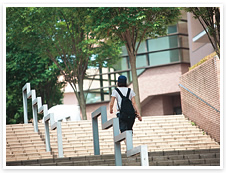 The Academic Year 2010 represented the final year of the 6-year midterm goal period of the first phase since the prefectural university became a public university corporation, and steady efforts have been made toward the achievement of those midterm goals. In addition to driving forward efforts for the following items (1)~(5) in accordance with the Priorities Plan of the 2010 Plan, initiatives characteristic of each department were carried out concerning educational research and regional contributions, etc. as specified for overall assessment.
The Academic Year 2010 represented the final year of the 6-year midterm goal period of the first phase since the prefectural university became a public university corporation, and steady efforts have been made toward the achievement of those midterm goals. In addition to driving forward efforts for the following items (1)~(5) in accordance with the Priorities Plan of the 2010 Plan, initiatives characteristic of each department were carried out concerning educational research and regional contributions, etc. as specified for overall assessment.
(1) Further Enhancement of Educational Capabilities
●Enhancements to academic guidance
We initiated a “Class Support System” and “Student Chart System” and worked for greater information sharing concerning educational, academic, and career guidance between guidance counselors. In addition, the “IWATE Studies” course shared between five universities within the prefecture was held, achieving a high degree of course satisfaction from students that completed the course.
●Organizational and systematic FD initiatives, including course evaluations
University-wide FD training sessions were carried out twice, and in addition to the implementation of unique methods such as the participation of students as panelists, there was also participation in the Iwate Higher Education Consortium FD camp.
●Review of liberal arts format
In order to promote the strengthening of foundational education and so on, a Fundamental Concept Review Board for the “Center for Higher Education Planning” (provisional name) was established.
●Promotion of international exchange
Five students took part in the first and second terms of the regular Japanese language education course intended for exchange students. As for the overseas exchange program, there was a considerable increase in the Korean language and Korean culture course with 13 participants, and report sessions were held together with the Chinese language and Chinese culture course at the university campus festival. Information collection was also initiated as we move toward not only expanding upon existing courses but also the creation of an English course.
●Consideration of adjustments to graduate school enrolment limitations
Changes in the implementation period, etc. for the entrance examination system were decided upon, aimed at reaching graduate school capacity.
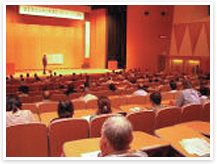 Open lecture
Open lecture
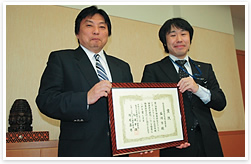 Briefing session for the Morioka City Community Planning Institute’s reception of the Award of Excellence
Briefing session for the Morioka City Community Planning Institute’s reception of the Award of Excellence
(2) Research Initiatives that Deal with Local Issues
●Establishment of the JST Industry-University-Government Joint Research Hub
The establishment of the Iwate Monodukuri and Software Integration Technology Center (i-MOS) in 2011 was decided, and we settled upon the research direction for the formation of an advanced development manufacturing industry collective. Also, in addition to a liaison conference that was held to promote built-in technology, professors from our university were also dispatched as coordinators to the Tohoku Built-in Industry Cluster, etc.
●Strengthening think-tank functionality for citizens of the prefecture
Thirty-seven topics were selected and joint research was performed concerning open research on community issues. The establishment of a Regional Policy Research Center starting in 2011 was decided, and a research promotion policy leading to the resolution of prefectural citizen lifestyle issues was settled upon. The Takizawa Village IPU Innovation Park Operations Council was also established, ten topics were chosen for collaboration promotion research, and joint research was promoted.
●Increase the procurement of outside funding, such as the Sciences Research Grant, etc.
Decisions on Iwate Prefecture’s “Advanced Built-in Technology Engineer Training System Preparation Project Grant” and “Manufacturing and Software Integration Engineer Training Project Grant” were received. “Lifestyle support-style community building utilizing ICT” was adopted in the research and development field of JST’s social technology R&D operations.
●Proactive announcement of contributions to the local community
In addition to holding the “IPU Regional Collaboration Forum” and distributing reports, a Public Policy Forum was also held. The 2008-2009 survey research of the Morioka City Community Planning Institute was awarded the “Award of Excellence” in the Urban Research GP. Also, students submitted research applications to the Takizawa Village “School Collaboration Revitalization Project” and participated in presentation contests.
●Further enhancement of open lectures
Open lectures were held ten times at the Takizawa campus, and after working to improve the content, the number of participants was 1,402.
(3) Building a Strong Relationship with Iwate’s high schools
●Improve joint projects between high schools and the university
We implemented initiatives such as orientation seminars at 49 schools, tours of the university for high school teachers, and the “Iwate High School Student Short Essay Competition.”
●Ongoing review of the overall entrance examination system
We actively disseminated information concerning 2011 admissions and changes in the entrance examination system for 2012 admissions and thereafter via university information sessions and high school visits. In addition, the Faculty of Policy Studies decided upon an entrance examination proposal for the 2013 academic year.
●Securing admission applicants
In addition to department admission policies corresponding to the entrance examination system changes for 2012 and thereafter being settled upon and made public, PR was also carried out utilizing forums, etc.
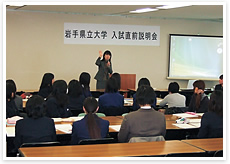 Pre-entrance examination information session
Pre-entrance examination information session
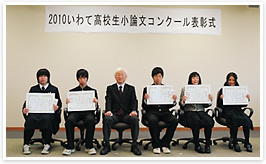 Iwate High School Student Short Essay Competition Award Ceremony
Iwate High School Student Short Essay Competition Award Ceremony
(4) Maintaining a High Employment Rate Even During Economic Downturn
●Support for career education
The university’s “Developing student-oriented reliable employability in Iwate” was adopted as a program of the Ministry of Education, Culture, Sports, Science and Technology, and the project was promoted.
●Expansion of thorough job-search support measures
Through an interview survey of graduates visiting potential employers and an analysis of questionnaire results, we verified ability requirements that will need future enhancement.
●Promoting the idea of our graduates settling in Iwate
We publish messages to IPU from local businesses, etc. in the University PR magazine and work to support graduates returning to the prefecture.
(5) Drastic Strengthening of the Promotion of Educational and Research Activities
●Optimize operations by clarifying the roles and jurisdictions of university operational organizations
By promoting participation in ability development training both within and outside of the university, we promoted improvement in the acquisition of basic and specialized knowledge related to staff roles and work.
●Adjust the management of faculty and staff quotas and implement an instructor evaluation system
In addition to settling upon an administrative plan concerning the number of teaching staff, proposals for a new teacher evaluation system were drawn up.
●Enhance PR and opinion-exchange activities
In addition to promoting improvements to the website and “Annual University Report” and the enrichment of the researcher directory, we also implemented regional briefing sessions for citizens in four locations within the prefecture concerning the preliminary draft of the midterm goals, etc. for the next phase.
●Improve the financial situation
Budgeting was made clearer through division into the categories of expenses needed to implement measures and operational expenses, and strategic budgetary allocation was performed.
●Strengthen facility management as well as safety measures
An earthquake response manual was drafted and disaster drills were carried out.
●The Faculty of Nursing established a Cancer Nursing Research Committee, and through training sessions and efforts to support certification applications, two OCNS (oncology clinical nurse specialists) were certified for the first time in the prefecture.
●The Department of Social Welfare started up the Nishiwaga Life Project, held a Life Cram School, and carried out hands-on practical training for social work and had students create field work reports.
●The Software Information Department promoted the department project “Research for Software that can Realize a Ubiquitous Information Society,” and 115 external research projects were announced (an increase of 3 over the previous year).
●The Faculty of Policy Studies performed three studies to review contributions made to local communities through research funds of the university as a whole.
●Morioka Junior College made efforts to support individuals taking the second-class architect examination, and 22 people acquired their qualifications for the exam.
●Miyako College established internship opportunities at local businesses and had 27 participants, or 2.5 times the average.


